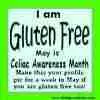-
Welcome to Celiac.com!
You have found your celiac tribe! Join us and ask questions in our forum, share your story, and connect with others.
-
Celiac.com Sponsor (A1):
Celiac.com Sponsor (A1-M):
-
Get Celiac.com Updates:Support Celiac.com!
Thyroid Reactions To Casein?
-
Get Celiac.com Updates:Support Celiac.com:
-
Celiac.com Sponsor (A17):
Celiac.com Sponsor (A17):
Celiac.com Sponsors (A17-M):
-
Recent Activity
-
- Fluka66 replied to Fluka66's topic in Celiac Disease Pre-Diagnosis, Testing & Symptoms6
Waiting for urgent referral.
Thank you again for your reply and comments which I have read carefully as I appreciate any input at this stage. I'm tending to listen to what my body wants me to do, having been in agony for many years any respite has been welcome and avoiding all wheat and lactose has thankfully brought this. When in pain before I was seen by a number of gynacologists... -
- knitty kitty replied to Nacina's topic in Related Issues & Disorders2
14 year old with Celiac & EOE still suffering...
Welcome to the forum, @Nacina, What supplements is your son taking? -
- knitty kitty replied to lasthope2024's topic in Food Intolerance & Leaky Gut8
help? This forum might be the last hope I have in my life. Please I beg you
@BluegrassCeliac, I'm agreeing. It's a good thing taking magnesium. And B vitamins. Magnesium and Thiamine work together. If you supplement the B vitamins which include Thiamine, but don't have sufficient magnesium, Thiamine won't work well. If you take Magnesium, but not Thiamine, magnesium won't work as well by itself. Hydrochlorothiazide... -
- BluegrassCeliac replied to lasthope2024's topic in Food Intolerance & Leaky Gut8
help? This forum might be the last hope I have in my life. Please I beg you
Hi, Not saying Thiamine (B1) couldn't be an issue as well, but Mg was definitely the cause of my problems. It's the only thing that worked. I supplemented with B vitamins, but that didn't change anything, in fact they made me sick. Mg stopped all my muscle pain (HCTZ) within a few months and fixed all the intestinal problems HCTZ caused as well. Mom... -
- Scott Adams replied to Nacina's topic in Related Issues & Disorders2
14 year old with Celiac & EOE still suffering...
It sounds like you've been through a lot with your son's health journey, and it's understandable that you're seeking answers and solutions. Given the complexity of his symptoms and medical history, it might be beneficial to explore a few avenues: Encourage your son to keep a detailed journal of his symptoms, including when they occur, their severity...
-




Recommended Posts
Archived
This topic is now archived and is closed to further replies.